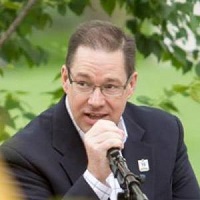A University of Missouri professor thinks Monday night’s presidential debate sets up anticipation for the next two face-offs.

MU Professor Mitchell McKinney – Photo Courtesy of University of Missouri
M.U. Communications Professor Mitchell McKinney’s been tracking presidential debates since the late 1980’s. He also did extensive research on every candidate’s performance in during this year’s primaries.
McKinney notes Hillary Clinton came out ahead in snap polling, focus groups and in a survey he did with college students following Monday’s debate. But he thinks it’s not known if Clinton can sustain a lead over Donald Trump. “It could be that this first debate performance to a very large audience could start some momentum in her favor” said McKinney. “And then the question is, can she maintain it as we go through the next couple of debates.”
In research McKinney conducted on college age voters with assistant M.U. Communications Professor Banjamin Warner, Hillary Clinton’s performance in the debate increased the likelihood students would vote for her from 43 percent before the debate, to 54 percent afterward. “In the four previous cycles from 2000 to 2012, the average candidate increase during the first debate was only one point” said Warner. “Clinton’s 10-point swing is the largest increase of any candidate we’ve seen in our presidential debate research.” Donald Trump’s support remained relatively the same, decreasing slightly from 28 percent prior to the debate, to 27 percent following it.
College students from seven campuses throughout the nation participated in last night’s study. Part of Clinton’s rise in the survey could possibly be explained by the party affiliation of those participating. 46 percent self-identified as Democrats while 38 percent were Republicans. Students taking part in the research were from Indiana University, Emerson College in Boston, Marquette University, Missouri State University, Rhodes College in Tennessee, Cameron University in Oklahoma, and the University of Wyoming.
The next debate takes place in about a week-and-a-half at Washington University in St. Louis. It’ll be conducted in the “town hall’ format, which McKinney helped develop as an advisor to the Commission on Presidential Debates in the early 1990’s.
McKinney says both Clinton and Trump will be judged on how they relate to everyday citizens, who play an important role in town hall events. He contends the candidates will likely still tangle with each other, but must react to other people. “(It’ll be) somewhat different than what we saw (Monday) night. It’s less formal. The candidates are there roaming about the stage, interacting with the citizens who are asking questions.” The Gallop research company recruits a range of American citizens to take part in the town hall debates.


